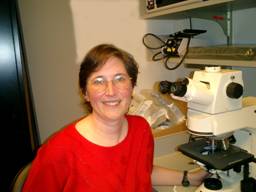|
|
 |
Dr. Lorenz received her B.S. in biology from Stanford University and her M.D. and Ph.D. in immunology from Washington University in St. Louis. She completed residency in Clinical Pathology at Barnes-Jewish Hospital, while also doing postdoctoral research in Gastrointestinal Biology at Washington University in St. Louis. She then joined the Washington University faculty as an Assistant Professor of Pathology and Medicine, where she also served as Medical Director of the Joint Clinical Immunology Laboratory for Barnes-Jewish and St. Louis Children’s Hospitals and Associate Director of the Laboratory Medicine Residency Training Program. Dr. Lorenz joined the UAB Department of Pathology in 2002. She is currently Associate Director of the Pathology Residency Training Program and Director of the Summer in Biomedical Sciences Undergraduate Research Program at UAB.
Dr. Lorenz’s research focuses on the interaction between gastrointestinal mucosal cells and luminal antigens. A major topic of investigation is the cellular immune response to Helicobacter in a mouse model of gastric infection and inflammation. This infection results in life-long colonization and gastric inflammation and is involved in the pathogenesis of peptic ulcer disease, gastric adenocarcinoma and mucosa-associated lymphoid tissue (MALT) lymphoma. Her laboratory established the essential role of the adaptive immune response in Helicobacter-induced gastric pre-neoplastic lesions and is characterizing the T cell response generated to the bacterium. The second area of focus in her laboratory is the role of the intestinal epithelium and innate immune responses in the development of inflammatory bowel disease. We are investigating these interactions in a spontaneous model of colonic inflammation that occurs in the absence of the multidrug resistance protein 1a.
Selected Publications
- Lorenz, R.G., and Gordon, J.I. Use of transgenic mice to study regulation of gene expression in the parietal cell lineage of gastric units. J. Biol. Chem. 268: 26559-26570, 1993.
- Guruge, J.L., Falk, P.G., Lorenz, R.G., Dans, M., Wirth, H.P., Blaser, M.J., Berg, D.E., Gordon, J.I. Epithelial Attachment alters the outcome of Helicobacter pylori infection. PNAS 95:3925-3930, 1998.
- Roth, K.A., Kapadia, S.B., Martin, S.M., and Lorenz, R.G. Cellular immune responses are essential for the development of Helicobacter felis associated gastric pathology. J. Immunol. 163:1490-1497, 1999.
- Newberry, R.D., Stenson, W.F., and Lorenz, R.G. Cyclooxygenase-2 dependent arachidonic acid metabolites are essential modulators of the intestinal immune response to dietary antigen. Nat. Med.5:900-906, 1999 (Cover).
- McCracken, V.J., and Lorenz, R.G. The gastrointestinal ecosystem: A precarious alliance between epithelium, immunity, and microbiota. Cell. Microbiol. 3:1-11, 2001.
- Newberry, R. D., McDonough, J .S., Stenson, W. F., and Lorenz, R. G. Spontaneous and continuous cycloxygenase-2 dependent prostaglandin E2 production by stromal cells in the murine small intestine lamina propria: directing the tone of the intestinal immune response. J. Immunol. 166:4465-4472, 2001.
- Newberry, R.D., McDonough, J.S., Stenson, W.F., and Lorenz, R.G. Spontaneous and continuous cycloxygenase-2 dependent prostaglandin E2 production by stromal cells in the murine small intestine lamina propria: Directing the tone of the intestinal immune response. J. Immunol. 166:4465-4472, 2001.
- Martin, S.M., Mehta, I.K., Thomas, M.L., Yokoyama, W.M., and Lorenz, R.G. Development of Intestinal Intraepithelial Lymphocytes, Natural Killer Cells, and Natural Killer 1.1+ T cells in CD45 Deficient Mice. J. Immunol. 166:6066-6073, 2001.
- Dube, P.H., Revell, P.A., Chaplin, D.D., Lorenz, R.G., Miller, V.L. A role for IL-1a in inducing pathologic inflammation during bacterial infection. Proc. Natl. Acad. Sci. USA. 98:10880-10885, 2001.
- Newberry, R.D., McDonough, J.S. and Lorenz, R.G. Post-gestational lymphotoxin/lymphotoxin b receptor interactions are essential for the presence of intestinal B-lymphocytes. J. Immunol. 168:4988-4997, 2002.